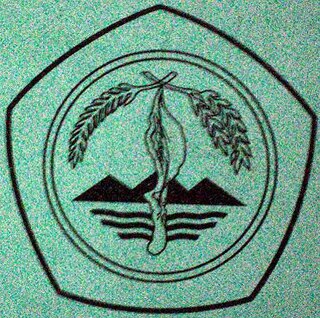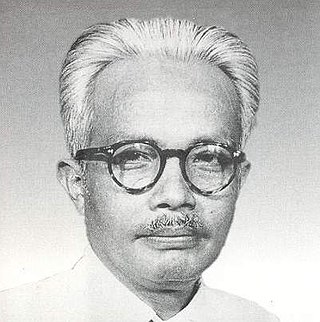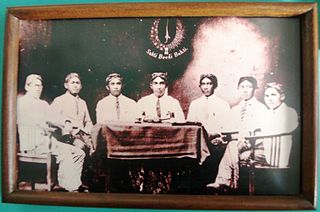
Gerungan Saul Samuel Jacob Ratulangi, known as Sam Ratulangi, was a Minahasan teacher, journalist, politician, and national hero from North Sulawesi, Indonesia. He was part of the committee that ratified the Constitution of Indonesia and served as the first Governor of Sulawesi.

Raden Mas Soewardi Soerjaningrat ; from 1922 also known as Ki Hadjar Dewantara, which is also written as Ki Hajar Dewantoro to reflect its Javanese pronunciation, was a leading Indonesian independence movement activist, writer, columnist, politician, and pioneer of education for native Indonesians in Dutch colonial times. He founded the Taman Siswa school, an institution that provided education for indigenous commoners, which otherwise was limited to the Javanese aristocracy and the Dutch colonials.

Paguyuban Pasundan is a Sundanese cultural organization that was founded on 20 July 1913, and is one of the oldest organizations in Indonesia that still operates. During its existence, the organization has been moving in the field of education, socio-cultural, politics, economy, youth and women empowerment. Thus, since 13 June 1919, it became political organisation/party, a member of the Association of Political Organisations of the Indonesian People. Paguyuban Pasundan works to preserve the Sundanese culture. There are also members of the Paguyuban Pasundan organisation who reside in the United States with other Indonesian diasporas. In this country, their community is centred in the capital city of Washington DC.

Indonesian Islamic Union Party was an Islamic political party in Indonesia before and after independence. In 1973 it was merged into the United Development Party.

Frans Hendrik Karel Zaalberg was an Indo (Eurasian) journalist and politician in the Dutch East Indies.

The Volksraad was an advisory, and later semi-legislative institution for the Dutch East Indies, provided for by law in 1916 but only established with the actual installation of the Council in 1918. It was a hesitant and slow attempt at democratisation of the Dutch East Indies as part of the "ethical policy" adopted by the Dutch government. The power of the Volksraad was limited as it only had advisory powers. Although part of the council was elected, only a small proportion of the population had voting rights.

Mohammad Husni Thamrin was a Eurasian-Betawi political thinker and Indonesian nationalist who advocated for the independence of the Dutch colony in the East Indies. After his death, he was regarded as an Indonesian National Hero.

Museum Kebangkitan Nasional or "Museum of National Awakening" is a history museum in Jakarta, Indonesia. The museum is dedicated for the history of Indonesian National Awakening.
Wahidin Soedirohoesodo (1852–1917) was a medical doctor and education reformer in the Dutch East Indies who co-founded the Javanese self-improvement society Budi Utomo. Therefore, he is sometimes considered an early figure in the Indonesian National Awakening. In 1973 he was declared a National Hero of Indonesia.

Soetomo was an Indonesian physician and nationalist. He was the co-founder of Boedi Oetomo, the first native political society in the Dutch East Indies, and led the Great Indonesia Party (Parindra) from 1935 until his death. Soetomo was declared a national hero by President Sukarno in 1961.

Ki Sarmidi Mangunsarkoro acted as the Minister of Education and Culture of Indonesia in 1949 until 1950. He is now regarded as a National Hero of Indonesia.

Parindra was the name used by two Indonesian political parties.

Brig. Gen. Daan Jahja or Daan Yahya was an Indonesian military officer who was the Chief of Staff of the Siliwangi Division in 1948 and the Military Governor of Jakarta from 1949 to 1950.

Indonesian nationalism is an ideology that arose during the Dutch colonial era in the Dutch East Indies which called for the colony's independence and unification as an independent and sovereign nation. This period of nationalist development under colonial rule is often called the Indonesian National Awakening. After Indonesia declared independence in 1945 and was recognized as independent of the Netherlands following the 1949 Indonesian National Revolution, Indonesian nationalism persisted as a set of ideologies supporting the continued independence and development of the newly formed country.
The Indonesian Fascist Party was a short-lived Fascist political party founded in Bandung, Dutch East Indies in the summer of 1933 by a Javanese economist and politician named Notonindito. Although it did not last long and is poorly documented, it is often cited as an example of how European Fascist ideas could manifest themselves in an Asian context, as well as appearing in conspiracy literature exaggerating its importance.

Jong Batak Bond, sometimes simply called Jong Batak, was a short-lived but influential Batak intellectual organization founded in Batavia, Dutch East Indies in December 1925. Like Budi Utomo, Jong Java and other such organizations, its members consisted of native Indonesian students in Dutch-language schools interested in advancing their ethnic group and Indonesian nationalism at the same time. Notable members of the group include Amir Sjarifuddin Harahap, Todung Sutan Gunung Mulia Harahap, Sanusi Pane, Saleh Said Harahap and Arifin Harahap.
The Indonesian People's Movement, better known as Gerindo, was a left-wing and nationalist political party in the Dutch East Indies which existed from 1937 to 1942. It had modest goals and was largely cooperative to the colonial administration. More strongly anti-fascist than anti-colonialist, the party sought to support the colonial government in opposing fascism, especially Japanese fascism.

Jong Java, 'Young Java', was a Dutch East Indies youth organization founded on March 7, 1915, by Satiman Wirjosandjojo at the STOVIA building under the name Tri Koro Dharmo. It was founded in response to the perceived elitism of the Budi Utomo movement by many young people at the time.
Abdul Rasjid Siregar gelar Mangaradja Mahkota Soeangkoepon, commonly known as Dr. Abdul Rasjid, was a politician and physician in the Dutch East Indies. He was elected or appointed to the Volksraad from 1931 to 1942, during which time he sat with the Indonesian nationalist faction. During the 1930s, he became convinced that public health and cooperation with traditional healers should be central to the mission of physicians in the Indies.
The Indonesian Islamic Party was an Islamic political party in the Dutch East Indies. Formed by dissenting members of the Indonesian Islamic Union Party (PSII) in 1938, the party was dissolved by the occupying Japanese in May 1942.















